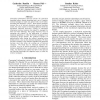Free Online Productivity Tools
i2Speak
i2Symbol
i2OCR
iTex2Img
iWeb2Print
iWeb2Shot
i2Type
iPdf2Split
iPdf2Merge
i2Bopomofo
i2Arabic
i2Style
i2Image
i2PDF
iLatex2Rtf
Sci2ools
111
click to vote
AAAI
1994
1994
Using Induction to Refine Information Retrieval Strategies
Conceptual information retrieval systems use structured document indices, domain knowledge and a set of heuristic retrieval strategies to match user queries with a set of indices describing the document's content. Such retrieval strategies increase the set of relevant documents retrieved (increase recall), but at the expense of returning additional irrelevant documents (decrease precision). Usually in conceptual information retrieval systems this tradeoff is managed by hand and with difficulty. This paper discusses ways of managing this tradeoff by the application of standard induction algorithms to refine the retrieval strategies in an engineering design domain. We gathered examples of query/retrieval pairs during the system's operation using feedback from a user on the retrieved information. We then fed these examples to the induction algorithm and generated decision trees that refine the existing set of retrieval strategies. We found that (1) induction improved the precis...
AAAI 1994 | Conceptual Information Retrieval | Information Retrieval Systems | Intelligent Agents | Retrieval Strategies |
Related Content
| Added | 02 Nov 2010 |
| Updated | 02 Nov 2010 |
| Type | Conference |
| Year | 1994 |
| Where | AAAI |
| Authors | Catherine Baudin, Barney Pell, Smadar Kedar |
Comments (0)

